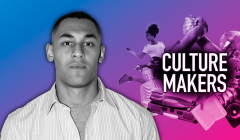
‘Subculture is the most powerful tool we have’
Louis Persent, Co-Founder and Creative Director at Weirdo on the power of embracing the niche

Sairah Ashman, Global CEO at Wolff Olins, sets out what it means to be a Conscious Brand and shares the lessons learnt from senior marketing leaders at a recent event.

“For there is always light, if only we're brave enough to see it. If only we're brave enough to be it” - US Youth Poet Laureate Amanda Gorman.
It was a fitting opening to our annual leadership summit last week, which this year was focused on Conscious Brands, a new era for branding.
“We believe it takes a different kind of brand to succeed in this environment: a conscious one,” says David Stevens, Wolff Olins Senior Strategy Director, who kicked off the event, alongside three incredible speakers, Barbara Martin Coppola, IKEA’s Chief Digital Officer, Tim Allen, Airbnb’s VP Design and Ulrike Decoene, AXA’s Group Head of Communication, Brands. They took to the virtual stage to talk our 200+ guests through the Six Signs of a Conscious Brand.
These are brands that we believe have six characteristics: empathy, multi-sensory, habitual, reformist, a collective approach, and are moral in their actions.
We believe the landscape for brands is radically shifting from a consumer, industry, technology, channel, organisational and societal perspective.
“Conscious brands behave differently, alive to the mood of the world, deeply attuned to human emotions, ready to adapt instantly to changing customer needs,” explains Stevens. “In a word, we call this responsive behaviour. But a conscious brand is also mindful of its societal role, its impact, its faults, its duties, the difference it can make. In a word, responsible.”
As leaders we are driving change and sometimes it can feel overwhelming, but we must believe that this is possible.
Barbara Coppola
While few brands sit in the intersection between responsive and responsible brands, the opportunity is now here to go much further over the next decade.
There is a movement happening now, says Coppola at IKEA and people are becoming more aware of the effect companies can have. They're calling for them to rise and take a stand to become conscious, both from a social and planet-positive perspective.
“Instead of focusing on short-term profits only, they need to balance their decisions carefully to take a broader perspective and have positive impact in society and the world at large,” says Coppola. “We believe a human-centric conscious agenda is the way forward and we've already started. We're on our way to being planet positive by 2030.”
This sort of agenda will be a must have for any brand moving forward, she adds: “It's not only the right thing to do, but it also makes business sense.”
Working for businesses that have a positive impact and a bigger purpose than the economic benefit is crucial to Coppola, who says that she chose to work at IKEA because of its value-based, very strong, human-centric brand.
She explains: “It's a tremendous, conscious brand. And that gives meaning to my work in digitising the company, transforming the company into the next era, to suit many more people. Our vision at IKEA is to create a better everyday life for the many people. People are at the centre of everything we do.”
While people, as in customers, have of course always been crucial to IKEA’s success, it now gives wider meaning to ‘people’: they are customers, co-workers, but then also society and the planet at large.
“Every single decision we take has to have a positive effect in all dimensions to move forward. It gives me a lot of pride. I believe we want to lead a change. And I hope we will inspire many other companies to join us and follow us in the pursuit of a human-centric strategy and company overall,” explains Coppola.
Leaving us with a final piece of advice, she acknowledges that no one is perfect, but we must still act now: “As business leaders, companies and individuals we can easily fall into a sense of powerless. We hope that someone else solves the climate crisis or transforms business models to be fit for the future, or any other complex issue that we are dealing with in the world. As leaders we are driving change and sometimes it can feel overwhelming, but we must believe that this is possible.”
As a brand we need to listen, learn, be humble and agile and accept we will make mistakes.
Ulrike Decoene
Great design is about understanding humanity.
Tim Allen
Sairah Ashman is Global CEO of brand consultancy Wolff Olins, where she oversees the business direction across its offices in London, New York and San Francisco. She’s passionate about working with ambitious leaders to help their businesses become great brands in world, the kind of radical and category-defining brands that represent something special for the people who buy from them and the people who work for them. She works across a wide range of jobs, helping to push creativity and challenge the work internally. Sairah is an alumna of Harvard Business School and Goldsmiths University of London, where she recently completed a Masters in Digital Sociology. She’s also an active supporter of The House of St Barnabas, working to break the cycle of homelessness, and a regular TEDx host and speaker.
Looks like you need to create a Creativebrief account to perform this action.
Create account Sign inLooks like you need to create a Creativebrief account to perform this action.
Create account Sign in